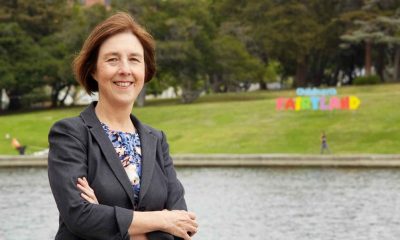Bay Area
Senator Nancy Skinner Provides Useful Guide to COVID-19 Financial Relief

After holding a teleconference Tuesday, Sen. Nancy Skinner released a wealth of information on how local community members and small business owners can access financial relief during the COVID-19 pandemic. Visit Sen. Skinner’s website.
Dear Constituent,
My telephone Town Hall on March 24 focused on financial relief actions that our state, federal, and local governments have taken to help those who’ve lost jobs or had hours reduced, small businesses that have had to close, and others that have been impacted by coronavirus/COVID-19.
Here’s a recap of the information relayed during the Town Hall, along with additional information about vital services that are available.
Tax deadlines: Both the state of California and the IRS have extended tax filing deadlines until July 15. However, if you are eligible for the federal EITC or Cal EITC and California’s child tax credit, filing your taxes before July 15 will help you get the benefit right away.
Property taxes: Contra Costa County and Alameda County tax assessors are working to waive late fees and penalties for those taxpayers facing economic hardship. Property tax revenue is very important to our counties to deliver services so if you’re able, please pay by April 10. If facing a hardship, go to your county tax assessor’s website for info on late fees/penalty waivers.
Federal stimulus package: The federal stimulus package, which is expected to be signed into law on March 27, includes a one-time payment of $1,200 to individuals who file a 2018 or 2019 return and earn an income of up to $75,000, or $2,400 payment for couples filing jointly with joint income of up to $150,000. In addition, those qualifying individuals or couples will also receive $500 per child. If your income as an individual is above $75,000 but below $99,000, or as a couple filing jointly above $150,000 but below $198,000, the amount of your check will be lower. Check federal websites for specifics.
Unemployment insurance: If you’ve lost your job or had your hours cut as a result of the crisis, apply online for unemployment insurance at EDD.ca.gov. Check here for eligibility.
The federal bill provides an extra $600 per week for up to four months for those receiving unemployment benefits. Under California law, many individuals, like Uber and Lyft drivers, who were treated by their employer as a 1099 or contract worker, are eligible for unemployment insurance, including the additional $600 federal payment because California law has reclassified many of these workers, even if the company that pays the worker has not done so yet. Legal Aid at Work provides details on this and more.
Disability insurance benefits (SDI): If you receive a W-2 from your employer, in most cases you have paid into the State Disability Insurance program (SDI). This program will provide disability insurance payments for those unable to work for more than eight days due to illness (such as COVID) or injury unrelated to your job. Check the Legal Aid at Work website for more information.
Paid family leave: Paid Family Leave provides benefits to Californians who need to take time off work to care for a seriously ill child, parent, parent-in-law, grandparent, grandchild, sibling, spouse, or registered domestic partner. Click here for more information.
Mortgages and foreclosures: Gov. Newsom announced that most major banks have agreed to allow residential property owners impacted by the crisis to miss mortgage payments for 90 days. In addition, the federal government suspended foreclosures and evictions to homeowners whose mortgage is guaranteed by Fannie Mae or Freddie Mac or is backed by the FHA or HUD. See HUD PDF for info on the federal program: foreclosure and eviction moratorium. Updates will be posted here.
Tenant evictions: Both Alameda County and Contra Costa County sheriffs’ offices have halted eviction proceedings during the crisis. In addition, some local cities, including Albany, Berkeley, and Emeryville, have enacted ordinances temporarily barring evictions and in some cases rent increases for renters and small businesses impacted by the crisis. Check each city’s website to see what measures they’ve put in place
Small business help: The U.S. Small Business Administration (SBA) is offering low-interest, long-term federal disaster loans to California small businesses, rental property owners, and private nonprofit organizations with no payments required for the first 12 months. Applicants may apply online.
Energy and Communications: PG&E and our local Community Choice energy providers have suspended shutoffs during the crisis. Also, most cellphone carriers and internet providers have signed the Federal Communications Commission (FCC) pledge to provide certain benefits during the COVID-19 emergency. The pledge requires companies to keep providing service to people unable to pay their bills due to the COVID-19 pandemic, waiving certain fees, and easing data restrictions to allow consumers to freely use data during the emergency.
Student Loans: As of March 20, 2020, the federal government has temporarily suspended the interest it collects on student loans, and federal lenders are letting borrowers suspend their student loans and loan payments without penalty for the next 60 days.
Parking enforcement: Many cities in our area have suspended parking enforcement. Go to your city’s website to see what your city has done on parking enforcement, extending business license deadlines, and more.
Relief Funds: Oakland and Berkeley have established relief funds for those impacted by the crisis. To find out what the funds support, and how you can contribute, go to https://www.oaklandfund.org/ and https://berkeleyrelieffund.org/
Medi-Cal/CalWORKs recipients: Gov. Newsom waived the 90-day annual redetermination reviews for Californians enrolled in Medi-Cal and CalWORKs. So, if you are currently enrolled in Medi-Cal or CalWORKs, rest assured your benefits will continue through June 16. If your Medi-Cal benefits were already terminated, you have to reapply.
New Medi-Cal applicants: The state has expedited Medi-Cal for new applicants, waiving certain paperwork requirements including citizenship docs. Homeless individuals just need to state on application that they are homeless and will be expedited. All applications can be done through the Covered California website.
CalFresh: If you qualify for and need CalFresh food assistance benefits (the state’s food stamp program), applications can be done online, at GetCalFresh.org. If you are already receiving CalFresh, you will keep your coverage through May and won’t need to be recertified.
Immigration rights: If you’re impacted by the crisis due to your immigration status, please see the Legal Aid at Work website for more information on how to get help.
More detailed information on, for example, unemployment insurance and disability insurance and who qualifies as well as the assistance available to small businesses from the US Small Business Administration, was provided during my March 24 Town Hall. My office will post an audio recording of the Town Hall on my website as soon as it’s available.
Please stay safe and practice the good direction from our public health experts to maintain 6-feet of distance when you are out for shopping or other legitimate needs, and wash your hands — soap and water is most effective!
Sincerely,
Nancy Skinner
Senator, 9th District
Activism
Oakland Post: Week of April 24 – 30, 2024
The printed Weekly Edition of the Oakland Post: Week of April 24 – 30, 2024

To enlarge your view of this issue, use the slider, magnifying glass icon or full page icon in the lower right corner of the browser window. ![]()
Alameda County
DA Pamela Price Stands by Mom Who Lost Son to Gun Violence in Oakland
Last week, The Post published a photo showing Alameda County District Attorney Pamela Price with Carol Jones, whose son, Patrick DeMarco Scott, was gunned down by an unknown assailant in 2018.

Publisher’s note: Last week, The Post published a photo showing Alameda County District Attorney Pamela Price with Carol Jones, whose son, Patrick DeMarco Scott, was gunned down by an unknown assailant in 2018. The photo was too small for readers to see where the women were and what they were doing. Here we show Price and Jones as they complete a walk in memory of Scott. For more information and to contribute, please contact Carol Jones at 510-978-5517 at morefoundation.help@gmail.com. Courtesy photo.
Bay Area
State Controller Malia Cohen Keynote Speaker at S.F. Wealth Conference
California State Controller Malia Cohen delivered the keynote speech to over 50 business women at the Black Wealth Brunch held on March 28 at the War Memorial and Performing Arts Center at 301 Van Ness Ave. in San Francisco. The Enterprising Women Networking SF Chapter of the American Business Women’s Association (ABWA) hosted the Green Room event to launch its platform designed to close the racial wealth gap in Black and Brown communities.

By Carla Thomas
California State Controller Malia Cohen delivered the keynote speech to over 50 business women at the Black Wealth Brunch held on March 28 at the War Memorial and Performing Arts Center at 301 Van Ness Ave. in San Francisco.
The Enterprising Women Networking SF Chapter of the American Business Women’s Association (ABWA) hosted the Green Room event to launch its platform designed to close the racial wealth gap in Black and Brown communities.
“Our goal is to educate Black and Brown families in the masses about financial wellness, wealth building, and how to protect and preserve wealth,” said ABWA San Francisco Chapter President LaRonda Smith.
ABWA’s mission is to bring together businesswomen of diverse occupations and provide opportunities for them to help themselves and others grow personally and professionally through leadership, education, networking support, and national recognition.
“This day is about recognizing influential women, hearing from an accomplished woman as our keynote speaker and allowing women to come together as powerful people,” said ABWA SF Chapter Vice President Velma Landers.
More than 60 attendees dined on the culinary delights of Chef Sharon Lee of The Spot catering, which included a full soul food brunch of skewered shrimp, chicken, blackened salmon, and mac and cheese.
Cohen discussed the many economic disparities women and people of color face. From pay equity to financial literacy, Cohen shared not only statistics, but was excited about a new solution in motion which entailed partnering with Californians for Financial Education.
“I want everyone to reach their full potential,” she said. “Just a few weeks ago in Sacramento, I partnered with an organization, Californians for Financial Education.
“We gathered 990 signatures and submitted it to the [California] Secretary of State to get an initiative on the ballot that guarantees personal finance courses for every public school kid in the state of California.
“Every California student deserves an equal opportunity to learn about filing taxes, interest rates, budgets, and understanding the impact of credit scores. The way we begin to do that is to teach it,” Cohen said.
By equipping students with information, Cohen hopes to close the financial wealth gap, and give everyone an opportunity to reach their full financial potential. “They have to first be equipped with the information and education is the key. Then all we need are opportunities to step into spaces and places of power.”
Cohen went on to share that in her own upbringing, she was not guided on financial principles that could jump start her finances. “Communities of color don’t have the same information and I don’t know about you, but I did not grow up listening to my parents discussing their assets, their investments, and diversifying their portfolio. This is the kind of nomenclature and language we are trying to introduce to our future generations so we can pivot from a life of poverty so we can pivot away and never return to poverty.”
Cohen urged audience members to pass the initiative on the November 2024 ballot.
“When we come together as women, uplift women, and support women, we all win. By networking and learning together, we can continue to build generational wealth,” said Landers. “Passing a powerful initiative will ensure the next generation of California students will be empowered to make more informed financial decisions, decisions that will last them a lifetime.”
-

 Activism4 weeks ago
Activism4 weeks agoOakland Post: Week of March 27 – April 2, 2024
-

 #NNPA BlackPress4 weeks ago
#NNPA BlackPress4 weeks agoBeloved Actor and Activist Louis Cameron Gossett Jr. Dies at 87
-

 Community1 week ago
Community1 week agoFinancial Assistance Bill for Descendants of Enslaved Persons to Help Them Purchase, Own, or Maintain a Home
-

 Activism3 weeks ago
Activism3 weeks agoOakland Post: Week of April 3 – 6, 2024
-

 Business1 week ago
Business1 week agoV.P. Kamala Harris: Americans With Criminal Records Will Soon Be Eligible for SBA Loans
-

 Activism2 weeks ago
Activism2 weeks agoOakland Post: Week of April 10 – 16, 2024
-

 Community1 week ago
Community1 week agoAG Bonta Says Oakland School Leaders Should Comply with State Laws to Avoid ‘Disparate Harm’ When Closing or Merging Schools
-

 Community6 days ago
Community6 days agoOakland WNBA Player to be Inducted Into Hall of Fame

























































